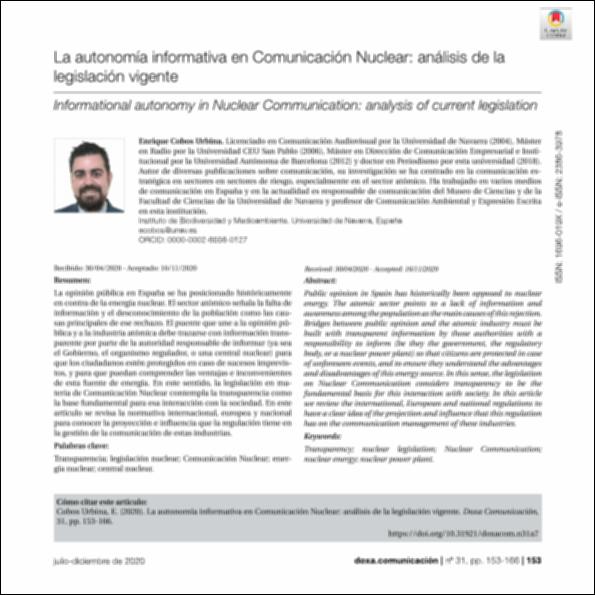Please use this identifier to cite or link to this item:
http://hdl.handle.net/10637/11746La autonomía informativa en Comunicación Nuclear: análisis de la legislación vigente.

See/Open:
es_a7_stamped.pdf
Español
343,89 kB
Adobe PDF
See/Open:
en_a7_stamped.pdf
English
429,37 kB
Adobe PDF
See/Open:
Articulo_7_ES_Doxa_31_Transparencia_Informatica_EPUB.epub
Español
479,08 kB
EPUB
See/Open:
Articulo_7_EN_Doxa_31_Nuclear_communication_EPUB.epub
English
489,34 kB
EPUB
| Title: | La autonomía informativa en Comunicación Nuclear: análisis de la legislación vigente. Informational autonomy in nuclear communication: analysis of current legislation. |
| Authors : | Cobos Urbina, Enrique |
| Keywords: | Transparencia.; Legislación nuclear.; Comunicación nuclear.; Energía nuclear.; Central nuclear.; Transparency.; Nuclear legislation.; Nuclear communication.; Nuclear energy.; Nuclear power plant. |
| Abstract: | La opinión pública en España se ha posicionado históricamente
en contra de la energía nuclear. El sector atómico señala la falta de
información y el desconocimiento de la población como las causas principales de ese rechazo. El puente que une a la opinión pública y a la industria atómica debe trazarse con información transparente por parte de la autoridad responsable de informar (ya sea
el Gobierno, el organismo regulador, o una central nuclear) para
que los ciudadanos estén protegidos en caso de sucesos imprevistos, y para que puedan comprender las ventajas e inconvenientes
de esta fuente de energía. En este sentido, la legislación en materia de Comunicación Nuclear contempla la transparencia como
la base fundamental para esa interacción con la sociedad. En este
artículo se revisa la normativa internacional, europea y nacional
para conocer la proyección e influencia que la regulación tiene en
la gestión de la comunicación de estas industrias. Public opinion in Spain has historically been opposed to nuclear energy. The atomic sector points to a lack of information and awareness among the population as the main causes of this rejection. Bridges between public opinion and the atomic industry must be built with transparent information by those authorities with a responsibility to inform (be they the government, the regulatory body, or a nuclear power plant) so that citizens are protected in case of unforeseen events, and to ensure they understand the advantages and disadvantages of this energy source. In this sense, the legislation on Nuclear Communication considers transparency to be the fundamental basis for this interaction with society. In this article we review the international, European and national regulations to have a clear idea of the projection and influence that this regulation has on the communication management of these industries. |
| Description: | En: Doxa Comunicación: revista interdisciplinar de estudios de comunicación y ciencias sociales. e-ISSN 2386-3978 n. 31, 2020, pp 153-166. |
| URI: | http://hdl.handle.net/10637/11746 |
| Rights : | http://creativecommons.org/licenses/by-nc-nd/4.0/deed.es |
| Issue Date: | 11-Dec-2020 |
| Center : | Universidad San Pablo-CEU |
| Appears in Collections: | Doxa.Comunicación nº 031 (2020) |
Items in DSpace are protected by copyright, with all rights reserved, unless otherwise indicated.

